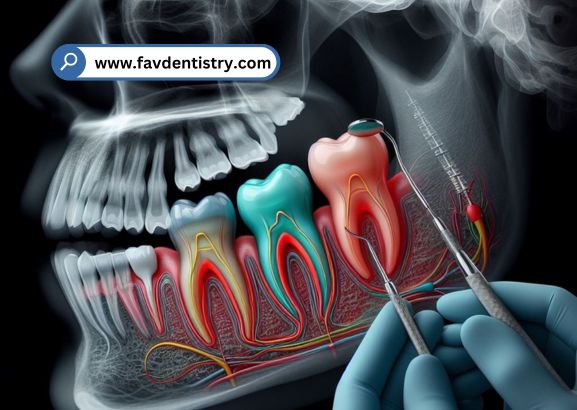Last Updated on 3 weeks by DR. ALBIN SIPES
Wisdom tooth removal can cause moderate to severe pain, but it varies among individuals. Wisdom tooth extraction can be a painful experience, with the level of discomfort ranging from moderate to severe, depending on the person.
The pain experienced after the procedure can be influenced by factors such as the position of the tooth, complexity of the extraction, and individual pain tolerance. While some individuals may only experience mild discomfort or soreness, others may have more severe pain that might require stronger pain medication.
Understanding the potential pain associated with wisdom tooth removal can help individuals prepare for the recovery process and make necessary arrangements to manage any pain or discomfort efficiently.

Credit: www.rozenbergdentalnyc.com
Fact 1: The Recovery Period Varied Based On Different Factors
The recovery period after a wisdom tooth removal can vary based on different factors. One crucial factor is the surgical technique used, which can affect the duration of pain experienced. Other factors influencing the length of the recovery period include the complexity of the procedure, the individual’s overall health, and any complications that may arise.
It’s important to note that everyone’s experience will be different, so it’s difficult to determine an exact timeframe for recovery. However, in general, most people can expect some discomfort during the first few days following the surgery, with gradual improvement over the following weeks.
Pain medication and proper oral care are typically recommended to manage any discomfort. It’s always advisable to consult with a dental professional for personalized advice and guidance throughout the recovery process.
Fact 2: Pain Medication Can Help Alleviate Discomfort
Pain medication plays a crucial role in managing discomfort after wisdom tooth removal. Prescription pain medications are commonly used to alleviate the pain. Following the instructions provided by the dentist is essential to ensure proper usage. It is important to be aware of the potential side effects associated with pain medications.
Nausea, drowsiness, and dizziness are some common side effects to watch out for. Consulting with the dentist about any concerns or side effects is recommended for a smoother recovery process.
Fact 3: The Potential For Complications Exists, But Is Rare
Wisdom tooth removal is generally not a painful procedure, but there is potential for rare complications to occur. These complications can arise during or after the removal process. However, it is important to note that the occurrence of these complications is rare.
In fact, most people experience a smooth and uneventful recovery. To further reduce the risks of complications, it is recommended to follow certain steps. These steps include maintaining proper oral hygiene, closely adhering to post-operative care instructions, and regularly visiting your dentist for check-ups.
By taking these precautions, you can minimize the chances of experiencing any complications associated with wisdom tooth removal. Overall, while complications are possible, they are unlikely, and with proper care, you can have a successful and pain-free recovery.
Fact 4: Everyone’S Pain Threshold Is Different
Everyone experiences different levels of pain when it comes to wisdom tooth removal. Pain thresholds vary between individuals, making the experience unique for each person. Managing discomfort during the procedure is crucial, and it’s important to consider your personal pain threshold.
Understanding your pain tolerance can help you choose the most suitable methods to alleviate discomfort. Some individuals may find over-the-counter painkillers sufficient, while others may require prescription medications. Additionally, icing the affected area, using numbing gels, and following post-operative care instructions provided by your dentist can help minimize pain.
Remember, everyone’s pain threshold is different, so it’s essential to find the most effective way to manage discomfort based on your individual needs and preferences.
Fact 5: Post-Operative Care And Oral Hygiene Are Essential
Post-operative care and oral hygiene are crucial after wisdom tooth removal to facilitate proper healing. Following the instructions provided by your dentist is of utmost importance to avoid complications. Maintaining good oral hygiene practices, such as gently brushing your teeth and rinsing with saltwater solution, helps prevent infections.
It is advised to avoid smoking, drinking alcohol, and using straws during the recovery period. Moreover, following a soft food diet and avoiding hard, crunchy, or sticky foods aids in the healing process. Engaging in gentle activities and avoiding strenuous exercises also contribute to a smooth recovery.
Remember, proper post-operative care and oral hygiene are vital for a pain-free and successful healing process.
Fact 6: Dry Sockets Are Uncommon, But Can Be Painful
Fact 6: dry sockets, while rare, can cause significant pain and discomfort after wisdom tooth removal. These sockets occur when the blood clot that forms after extraction becomes dislodged or dissolves too quickly. Symptoms of dry sockets include intense throbbing pain, bad breath, and an unpleasant taste in the mouth.
Causes and risk factors for developing dry sockets include smoking, poor oral hygiene, extracting difficult or impacted teeth, and certain medications. To treat dry sockets, your dentist may prescribe antibiotics, or painkillers, or apply a medicated dressing to the affected area.
To prevent dry sockets, follow post-operative instructions like avoiding straws or smoking, maintaining good oral hygiene, and eating soft foods. While dry sockets are not common, they can be painful, so consult your dentist if you suspect you may have one.
Fact 7: Wisdom Tooth Removal Techniques Have Improved Over Time
Wisdom tooth removal techniques have significantly improved with the advancements in technology and tools. These modern procedures are designed to minimize pain and enhance the recovery process. Using state-of-the-art equipment and advanced surgical methods, dentists can efficiently extract wisdom teeth with reduced discomfort.
In the past, the extraction process often involved invasive surgery, leading to prolonged recovery and intense pain. However, thanks to these advancements, patients can now experience a more comfortable and less painful procedure. The evolution of wisdom tooth extraction techniques has revolutionized oral surgery, providing patients with a better overall experience.
These innovative methods not only contribute to a smoother and quicker recovery but also help alleviate the anxiety and fear associated with wisdom tooth removal.
Frequently Asked Questions On How Bad Does A Wisdom Tooth Removal Hurt
Does Wisdom Tooth Removal Hurt?
Wisdom tooth removal can cause mild to moderate discomfort, but the level of pain varies for each person. Your dentist will numb the area before the procedure and may prescribe pain medication for post-operative pain management. Following post-operative care instructions can minimize pain and promote healing.
How Long Does The Pain Last After Wisdom Tooth Removal?
Pain after wisdom tooth removal typically lasts for a few days to a week. The initial discomfort usually subsides within the first few days, and any residual pain gradually decreases over the next week. Following post-operative care instructions and taking prescribed pain medication can help manage the pain effectively.
What Can I Do To Manage Pain After Wisdom Tooth Removal?
To manage pain after wisdom tooth removal, you can apply an ice pack to the affected area, take prescribed pain medication as directed, and avoid activities that may irritate the extraction site, such as brushing vigorously or using a straw.
Following post-operative care instructions is essential for effective pain management.
Are There Any Risks Or Complications Associated With Wisdom Tooth Removal?
As with any surgical procedure, there are risks and potential complications involved in wisdom tooth removal. These may include bleeding, infection, dry socket, nerve damage, and jaw stiffness. However, these complications are rare, especially when the procedure is performed by an experienced dentist and post-operative care instructions are followed.
How Long Does It Take To Heal After Wisdom Tooth Removal?
The healing time after wisdom tooth removal varies from person to person. Generally, the initial healing phase takes about 1-2 weeks, during which the extraction site closes and the gum tissue regenerates. However, complete healing of the socket and surrounding tissues may take several months.
Proper oral hygiene and following post-operative care instructions are crucial for optimal healing.
Conclusion
Undergoing a wisdom tooth removal can be a daunting prospect, but the level of pain experienced varies from individual to individual. Most people will experience mild to moderate discomfort after the procedure, which can be managed with over-the-counter painkillers. It is important to follow post-operative care instructions provided by the dentist to minimize pain and complications.
Applying cold compresses, eating soft foods, and rinsing with warm saltwater can aid in healing and reduce discomfort. While some may experience more severe pain, it is typically temporary and can be managed with prescribed medications. Remember to consult with your dentist or oral surgeon for any concerns or questions about the healing process.
Overall, with proper care and pain management, the discomfort experienced after wisdom tooth removal can be minimized, allowing you to return to normal daily activities in no time.





